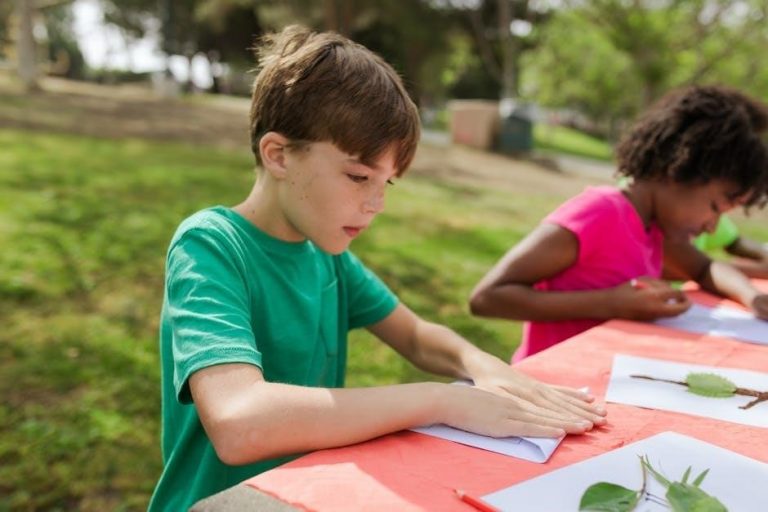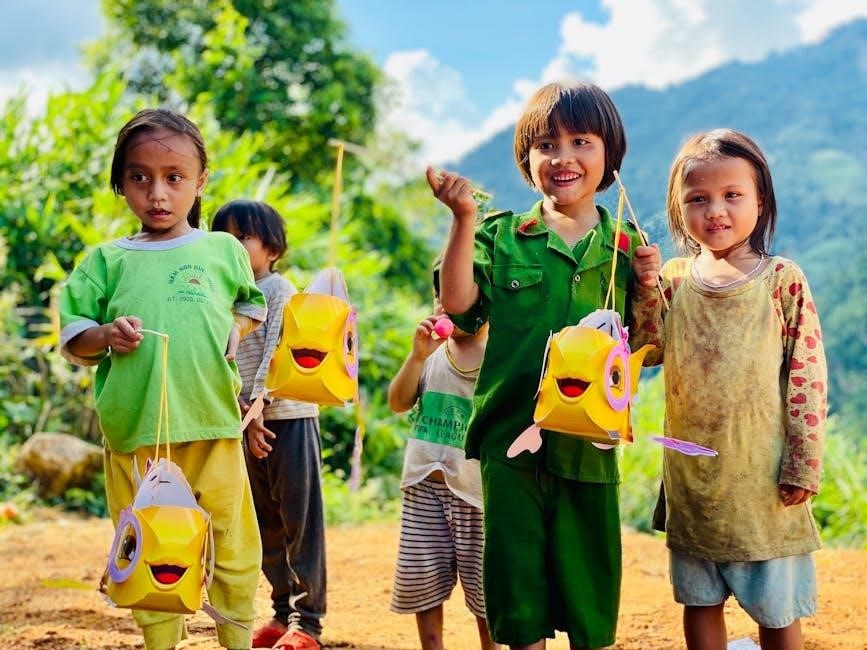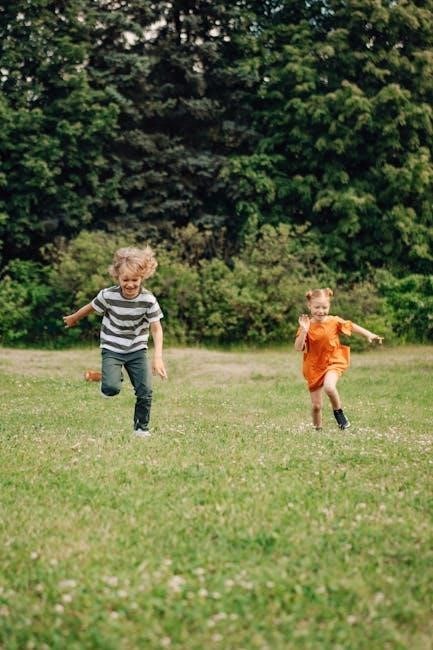
Childhood friendships are among the first and most formative relationships in life‚ shaping social bonds and emotional growth․ These early connections‚ formed without pretense‚ lay the groundwork for trust and empathy‚ becoming a cornerstone of personal development and lifelong relationships․
Defining Childhood Friendships
Childhood friendships are genuine‚ often formed through shared experiences‚ curiosity‚ and a sense of belonging․ These early bonds are built on trust‚ support‚ and acceptance‚ fostering social-emotional development․ They are rooted in simplicity‚ free from the complexities of adult relationships‚ making them uniquely pure and foundational to lifelong connections․
The Role of Proximity and Shared Experiences
Proximity plays a significant role in forming childhood friendships‚ as children often connect with those nearby․ Shared experiences‚ such as playing together or attending the same school‚ foster strong bonds․ These interactions create trust‚ empathy‚ and a sense of belonging‚ laying the foundation for meaningful relationships that can last a lifetime․

The Importance of Childhood Friendships
Childhood friendships significantly impact emotional development‚ social skills‚ and provide a support system‚ fostering resilience and happiness while countering loneliness and enhancing overall well-being and life satisfaction․
Emotional Development and Empathy
Childhood friendships play a crucial role in fostering emotional development by teaching empathy‚ understanding‚ and emotional intelligence․ Through shared experiences‚ children learn to recognize and navigate others’ feelings‚ developing compassion and forming deeper connections that support mental health and well-being throughout their lives․
Development of Social Skills
Childhood friendships serve as a foundation for developing essential social skills‚ such as cooperation‚ communication‚ and conflict resolution․ Through play and interaction‚ children learn to navigate group dynamics‚ share perspectives‚ and understand boundaries‚ fostering adaptability and confidence in their future relationships and societal interactions․
Support System and Reduced Loneliness
Childhood friendships provide a vital support system‚ offering emotional backing and reducing feelings of isolation․ Friends act as a safety net‚ helping children navigate challenges and fostering a sense of belonging․ This connection not only combats loneliness but also enhances overall well-being‚ equipping children with resilience and confidence to handle life’s adversities effectively․

Factors That Influence Childhood Friendships
Childhood friendships are shaped by proximity‚ shared environments‚ and family backgrounds․ Geographic location and economic status often determine access to social opportunities‚ influencing the formation and sustainability of these relationships․
Geographic Location and Shared Environment
Geographic location significantly influences childhood friendships‚ as it determines where children grow up‚ attend school‚ and play․ Shared environments‚ such as neighborhoods or schools‚ provide common spaces for interaction‚ fostering familiarity and trust․ Proximity often leads to frequent interactions‚ which are crucial for building strong‚ lasting bonds and mutual understanding among children․
Family Background and Economic Status
Family background and economic status play pivotal roles in shaping childhood friendships․ Children from similar economic backgrounds often share similar opportunities and challenges‚ fostering mutual understanding․ Additionally‚ family values and socialization practices influence how children interact and form relationships‚ creating a foundation for empathy and support that can transcend economic boundaries over time․

The Role of Educators in Fostering Friendships
Teachers play a crucial role in fostering friendships by creating inclusive environments and teaching social-emotional skills‚ encouraging empathy‚ collaboration‚ and teamwork among students․
Creating Inclusive Classroom Environments
Educators foster friendships by creating inclusive classrooms where all students feel valued and respected․ Strategies like group activities‚ diversity appreciation‚ and conflict resolution encourage collaboration‚ reduce biases‚ and help students build connections․ Such environments promote mutual respect‚ empathy‚ and a sense of belonging‚ laying the foundation for lasting friendships․
Teaching Social-Emotional Learning
Educators play a vital role in fostering friendships by teaching social-emotional learning (SEL)․ SEL helps children develop empathy‚ communication‚ and conflict-resolution skills‚ enabling them to form positive relationships․ By encouraging kindness‚ active listening‚ and understanding‚ educators create a foundation for children to build trust and cooperation‚ essential for meaningful and enduring friendships․

Signs That Childhood Friendships Are Worth Keeping
Childhood friendships are worth keeping when they foster trust‚ reliability‚ and emotional support․ Shared values and interests strengthen bonds‚ creating a foundation for lifelong connections and mutual understanding․
Shared Values and Interests
Shared values and interests create a strong bond‚ fostering trust and mutual understanding․ When childhood friends have common hobbies or beliefs‚ it strengthens their connection‚ creating a sense of belonging․ These shared elements often form the foundation of lasting friendships‚ as they provide a basis for empathy and cooperation‚ making relationships more meaningful and enduring․
Trust and Reliability
Trust and reliability form the bedrock of lasting childhood friendships․ When friends can depend on one another‚ it fosters a sense of security and loyalty․ These qualities allow children to navigate challenges together‚ knowing they have consistent support․ Trust builds emotional resilience and strengthens bonds‚ making friendships more enduring and meaningful over time․
Emotional Support and Understanding
Childhood friends often provide unwavering emotional support‚ offering comfort during difficult times․ This understanding fosters a safe environment where children can express their feelings openly․ Such support enhances emotional resilience‚ helping kids navigate challenges and develop empathy․ It plays a crucial role in their mental well-being and ability to form healthy relationships later in life․
How to Maintain Childhood Friendships
Maintaining childhood friendships requires regular communication‚ nurturing shared interests‚ and overcoming geographic barriers․ Consistent effort and mutual commitment ensure these bonds remain strong over time․
Regular Communication
Regular communication is vital for maintaining childhood friendships․ Scheduling consistent check-ins‚ whether through calls‚ texts‚ or video chats‚ ensures connections remain strong․ Sharing life updates and memories fosters closeness and understanding‚ preventing friendships from fading over time․ Open dialogue helps address misunderstandings and strengthens trust‚ keeping the bond alive and meaningful․
Nurturing Shared Interests
Nurturing shared interests strengthens childhood friendships by creating common ground and Fond memories․ Engaging in hobbies‚ games‚ or activities you both enjoy fosters a sense of unity and purpose․ Whether it’s sports‚ art‚ or music‚ shared passions provide a foundation for connection‚ making friendships more meaningful and enduring over time․
Overcoming Geographic Barriers
Geographic barriers can test childhood friendships‚ but technology and commitment help bridge distances․ Regular communication through calls or social media keeps bonds strong․ Planning visits or shared online activities reinforces connections‚ proving that true friendships endure despite physical separation‚ fostering lifelong ties and memories․
The Long-Term Benefits of Childhood Friendships
Childhood friendships foster lifelong connections‚ providing emotional stability and a sense of belonging․ They contribute to personal growth‚ mental well-being‚ and a strong support network throughout life․
Lifelong Support Networks
Childhood friendships often evolve into enduring support systems‚ offering emotional backing and practical assistance․ These networks provide a sense of continuity and reliability‚ helping individuals navigate life’s challenges with confidence and resilience‚ fostering a lasting impact on personal and professional growth throughout their lives․
Influence on Personal Growth
Childhood friendships significantly shape personal growth by fostering empathy‚ self-awareness‚ and resilience․ Friends challenge and inspire us‚ encouraging us to step out of our comfort zones and explore new perspectives․ These relationships help build confidence and character‚ laying a strong foundation for future personal and professional development throughout life․
Impact on Mental Health
Childhood friendships play a vital role in mental health by reducing loneliness and providing emotional support․ These relationships foster resilience‚ helping individuals cope with stress and adversity․ Strong‚ positive friendships in early life contribute to better emotional well-being and can set the foundation for healthy mental health outcomes throughout adulthood․

Challenges in Maintaining Childhood Friendships
Maintaining childhood friendships often faces obstacles like geographic separation‚ life transitions‚ and diverging interests․ These challenges can strain relationships‚ making it difficult to preserve the bond over time․
Drifting Apart Due to Life Changes
As individuals grow‚ life changes like relocation‚ career pursuits‚ or differing priorities often create distance․ Shared routines fade‚ and evolving interests may lead to divergence‚ making it harder to maintain close bonds naturally over time․
Conflicts and Misunderstandings
Conflicts and misunderstandings can strain childhood friendships․ Differences in opinions‚ miscommunication‚ or unresolved issues may lead to tension․ If not addressed‚ these conflicts can create lasting rifts‚ making it challenging to preserve the bond that once seemed unbreakable․
Balancing Different Life Paths
As individuals grow‚ life paths often diverge‚ leading to different interests‚ careers‚ or locations․ Balancing these varied trajectories while maintaining childhood friendships can be challenging but is possible with mutual effort and understanding‚ ensuring the bond remains strong despite differing life directions․

The Emotional Bond of Childhood Friendships
Childhood friendships foster a deep emotional bond‚ creating a sense of belonging and shared history․ These relationships often involve unconditional acceptance‚ trust‚ and cherished memories‚ forming a lifelong connection․
Memories and Nostalgia
Childhood friendships are often filled with cherished memories‚ creating a deep sense of nostalgia․ Shared experiences‚ laughter‚ and adventures form a bond that remains vivid over time‚ fostering a lifelong connection and sentimental value to these early relationships․
Unconditional Acceptance
Childhood friendships often thrive on unconditional acceptance‚ where individuals embrace each other without judgment․ This pure form of acceptance fosters trust‚ security‚ and a deep emotional bond‚ creating a safe space for growth and shared experiences․
Shared Identity and Belonging
Childhood friendships often create a shared identity‚ fostering a sense of belonging and unity․ These bonds are strengthened through common experiences‚ mutual interests‚ and collective memories‚ forming a lasting connection that defines who we are and where we come from․
Childhood friendships form the foundation of lifelong connections‚ shaping personal growth and emotional well-being․ Their enduring value lies in the shared memories and bonds that forever influence who we become․
Recap of Key Points
Childhood friendships play a vital role in emotional development‚ fostering empathy‚ trust‚ and social skills․ They provide support‚ reduce loneliness‚ and create lasting memories․ Educators can nurture these bonds by promoting inclusive environments and teaching social-emotional learning․ Maintaining these friendships requires effort‚ such as regular communication and shared activities‚ despite life’s challenges․
Final Thoughts on the Value of Childhood Friends
Childhood friendships are timeless treasures that shape our identities and provide lifelong support․ They foster trust‚ empathy‚ and joy‚ offering a sense of belonging and understanding․ These early bonds often withstand time and change‚ proving their profound impact on personal growth and mental well-being‚ making them invaluable throughout life․
